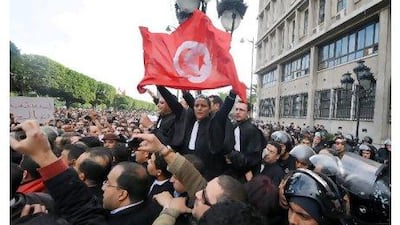Man Group, the world's biggest publicly traded hedge fund, says UAE stock valuations are among the lowest in the world and could rebound in an improved regional political environment.
Tomorrow's exclusives tonight:
Industry Insights e-newsletter Stay ahead of the pack and get the pick of the premium Business content straight to your inbox. Sign up
The share prices of Abu Dhabi and Dubai companies are trading at 7.9 times earnings, while the GCC average is 11 times.
Those in emerging markets and Europe currently trade at about 10 times earnings, while in the US it is closer to 12 times earnings.
"The Arab Spring is destabilising to lots of investors, but essentially the fundamentals are there," said Jamil Baz, the global chief investment strategist at Man, which has US$65 billion (Dh238.69bn) of assets under management.
"UAE equity markets are among the cheapest in the world, so if we see an improvement in stability, there is massive upside for the region, and the UAE in particular."
Local markets have taken a beating this year, triggered first by popular uprisings that toppled autocratic leaders in Tunisia, Egypt and Libya, followed by Europe's worsening debt crisis, both of which have battered investor confidence.
The Abu Dhabi Securities Exchange (ADX) General Index is down almost 10 per cent since January, when protests began in Tunisia after a fruit vendor, Mohamed Bouazizi, died of burn injuries suffered when he set himself on fire in December.
Dubai's main measure, the Dubai Financial Market (DFM) General Index has fallen by a little under 15 per cent in the same period and the FTSE Nasdaq Dubai UAE 20 Index about 18 per cent. The value of trading on the ADX and DFM has declined by two thirds this year, to Dh110 million yesterday, down from the Dh300m daily average for the year.
Individual foreign investors account for less than 3 per cent of total trading, while institutional investors make up 35 per cent.
Mr Baz's comments come against the background of remarks by Angela Merkel, the German chancellor, on Tuesday, that "Europe faces the toughest hour since World War II" and Italy's premier in waiting, Mario Monti, held meetings with his country's political parties to put together a cabinet to steer the euro zone's third-biggest economy through its debt crisis.
The country's borrowing costs have risen, with yields on 10-year bonds at 7.02 per cent, surpassing the 7 per cent threshold last week that raised fears the country was running out of money and was on the brink of a default.
The Middle East should weather the effects of the European debt crisis better than emerging markets, Mr Baz said, because it was mostly driven by oil prices and less integrated into world trade than emerging markets in Asia.
"The region … will suffer, but it will suffer less, relatively, than non-Japan Asia, where a big part of the production platform is geared towards Europe," he said.

